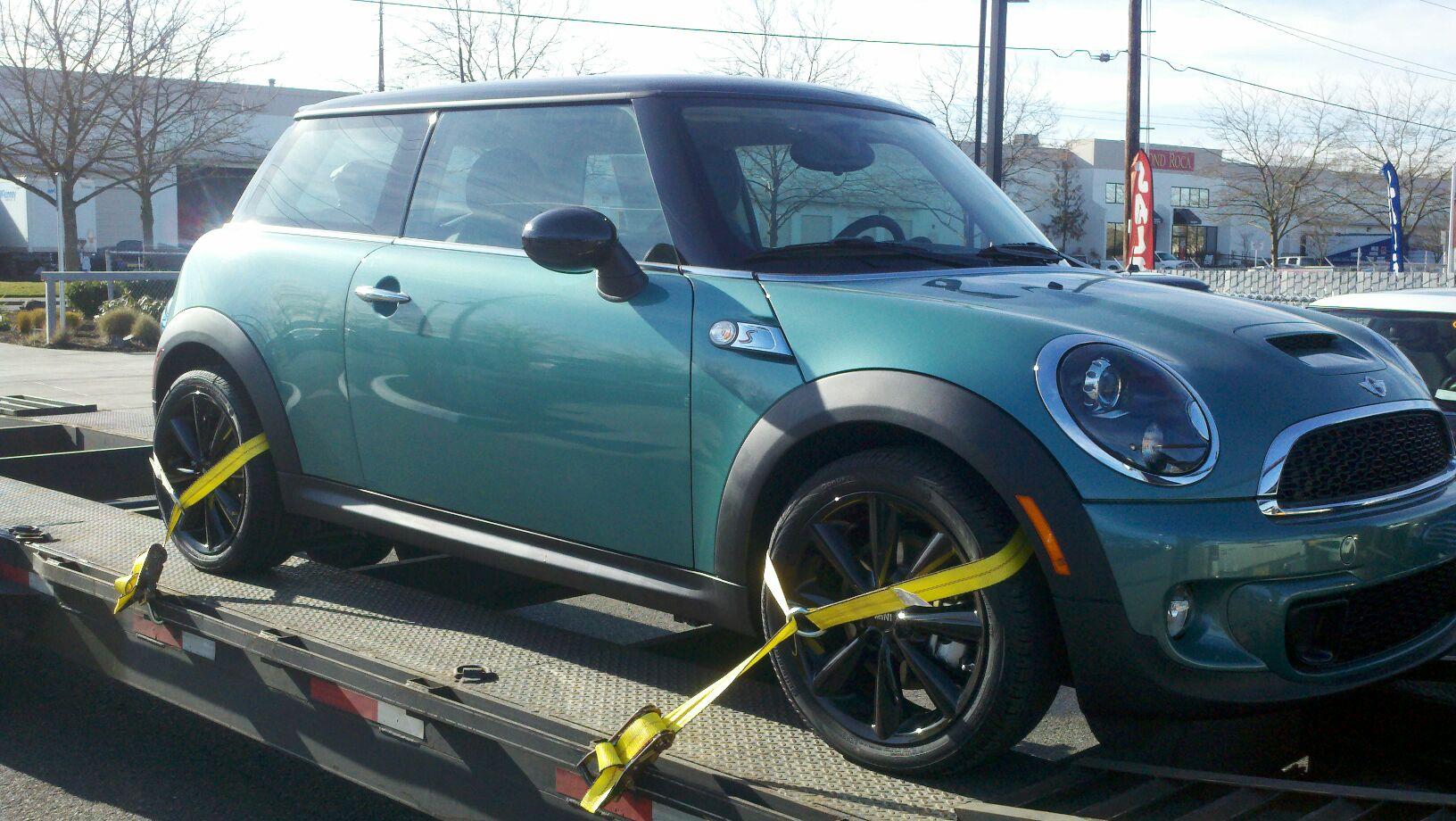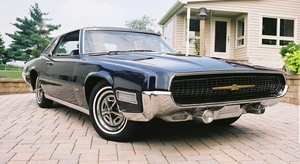Thanks for all the ideas.....
once I had a project car on my trailer , let half the air out of the tires and put the ratchet straps and filled the tires back up !
Super solid and it did not move on the long trip home :)
As far as safety chains , in California they are required and you can often see the CHP pull up to your side and look that you have them ,
But I was told that it was best to cross them under the tongue so if the tow ball came loose or the receiver comes loose the tongue will not bury into the road.....
Thoughts ?
They're supposed to be crossed, I know that. IIRC it was part of a DOT safety inspection. Can't think of any reason why NOT to cross them.
But that's not necessarily the same as straps.
I use T-hooks into the unibody 'frame rails' on my E36 M3, with some Macs straps that get crossed (!) as that's how you keep the T-hooks tensioned/in-place. Not sure how I'd run the straps straight using the T-hook method given the wheels would be in the way. Been doing this for 5-6 years and all is well.
Most other cars I've towed haven't had spots for T-hooks so I use a set of wheel/axle straps and fasten those down in straight lines.

wspohn
Dork
9/17/20 11:19 a.m.
I always ran two straps over the rear axle, then winched the car forward until it hunkered down a tad, and attached two more straps up front so you had four straps plus the trailer winch attached to it and the suspension kept everything lightly tensioned. Worked well for a few decades for me.
Keith Tanner said:
They're supposed to be crossed, I know that. IIRC it was part of a DOT safety inspection. Can't think of any reason why NOT to cross them.
But that's not necessarily the same as straps.
I agree....
And one of our forest fires this year was caused by tow chains sparking on the ground , so watch out for that.
Brake_L8 (Forum Supporter) said:
I use T-hooks into the unibody 'frame rails' on my E36 M3, with some Macs straps that get crossed (!) as that's how you keep the T-hooks tensioned/in-place. Not sure how I'd run the straps straight using the T-hook method given the wheels would be in the way. Been doing this for 5-6 years and all is well.
Exactly how I do it on my 318ti.
californiamilleghia said:
Keith Tanner said:
They're supposed to be crossed, I know that. IIRC it was part of a DOT safety inspection. Can't think of any reason why NOT to cross them.
But that's not necessarily the same as straps.
I agree....
And one of our forest fires this year was caused by tow chains sparking on the ground , so watch out for that.
Safety chains are supposed to be crossed so that if the ball fails somehow then the hitch of the trailer will be caught by the chains rather than dragging on the ground. It provides marginally more control over what the trailer does in an emergency than the alternative.
I only cross straps as a temporary thing if there isn't enough room between the attachment points on the car and the trailer for the entire ratchet mechanism. The right answer in that case is to get different straps or put new attachment points on the trailer, but sometimes that's not feasible in the short term.
I have used transporter-rated chains, come-alongs, axle straps, and ratcheting straps, both with and with E-Tracks. Not all at the same time. I have only used tire-bonnets on my tow dolly, which came with the tire bonnets. I never quite liked the idea of straps through the wheels, but my vehicles on my trailer often had wire wheels. My favorite (and last) tie-down setup was E-Tracks and ratcheting straps with E-Track ends. Allowed the greatest flexibility, when trailering different cars.
I went with redundancy so that if any tie-down failed, the other side would still hold the car on. I never liked crossed straps, for the reasons demonstrated above.
My trailer was un-sprung. I typically strapped down the suspension, not the body. I towed a lot of places, often long distances, over 35+ years.

pirate
HalfDork
9/17/20 5:42 p.m.
When I secure car to trailer or car we pull behind motorhome on dolly I always stop within first 10 miles miles and check straps and usually can get a couple more clicks on ratchet straps. I always check straps at every stop we make rather for fuel, rest area, etc. after first check usually doesn't require any tightening but only takes a couple minutes.

Claff
Reader
9/17/20 11:49 p.m.
NAs are easy, I use the factory tow hooks and cross the straps.
NC/ND less easy. Axle straps around the lower control arms, cross the front but not the rears.
Been towing for eleven years now, haven't lost one yet.
I used to cross straps because "someone" told me that was the way it's done. Now I just use 4 straps, uncrossed. Depending on the car, I'll anchor from the tow hooks or pass the straps through the wheels. I have lost a car off a trailer, and watched it disappear in the rear view mirror. Luckily, no one was behind me, the car ( a Formula Vee) came to rest gently against the guardrail, and the trailer deck was only 7" high, so no damage aside from the embarrassment of reloading it in the middle of town. It was strapped down with only two straps passed through loops on the trailer and hooked to the car. The front one came undone and the rear hooks let go after the car went off the back. Lesson learned.
Claff said:
NAs are easy, I use the factory tow hooks and cross the straps.
NC/ND less easy. Axle straps around the lower control arms, cross the front but not the rears.
Been towing for eleven years now, haven't lost one yet.
I hook into holes in the control arms or subframes.
One thing to keep in mind when you're using chains and 10,000 lb straps - the tie down points on the trailer have a rating too. On E track, it's about 2000 lbs. Recessed D rings are much the same.
When I hauled the BatVan to Florida, I didn't cross the rear straps; it slowly worked its way to the edge of the trailer!
Tip: The excess strap that flaps in the breeze, roll it up and zip tie it to itself, duct tape gets sticky.
Not my photo, but we use this style. I am not a fan. They are easy to use but they just don't seem secure enough for me. Due to wheel choices and brake clearance running them through the wheels doesn't work.


nocones
UltraDork
9/18/20 12:00 p.m.
Man Britian's wierd.. Compared to America where each individual strap can support the load, trailer, and tow vehicle suspended beneath it. Tiff's tiedown technique is.. Rope.

He's also towing a classic Lotus 49 towed by a Morris Traveler 1000 with all of 48 HP. From this very entertaining well done video here HOW THIS CAR CHANGED MY LIFE - TIFF NEEDELL. Morris 1000 Traveller full story.
I tie down with 4 3" ratchet straps to the chassis. I frequently forget to hook up a safety chain and need to start being better about it. I cross in the back, run straight in the front because that's what I've seen and got used to.
I'm considering swaping to wheel straps and may try that next time I tow.

I usually resort to my training as a cargo helicopter flight engineer/load master. Redundancy and overkill with tie-downs. On aircraft loads we had restraints for double load weight for forward and 1 1/2 rear. Crossing straps is for lateral securement and to get tie-down angle. Want the smallest angle you can get to the tie-down ring. That's the strongest for the tie-down ring. I usually cross one set of straps and use another set straight pull. This bit about straps breaking, either need new straps or something is damaging the straps. Walk around checking and tightening straps as required at every stop is a good practice.
Now saying all that, I did have to break that rule once. Towing a parts car home a few hundred miles I tied it down correctly but get a few miles down the road, looking in the mirror I noticed the car rolling on the trailer. Good thing it was a trailer with sides and a tail gate. After tightening again twice I figured out that the rear axle was held in only by the drive shaft. The car was so rusted that the rear suspension wasn't attached to anything. So I ran straps over the top of the hood and trunk to secure it.




































